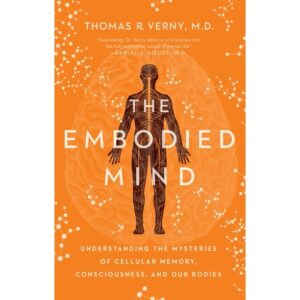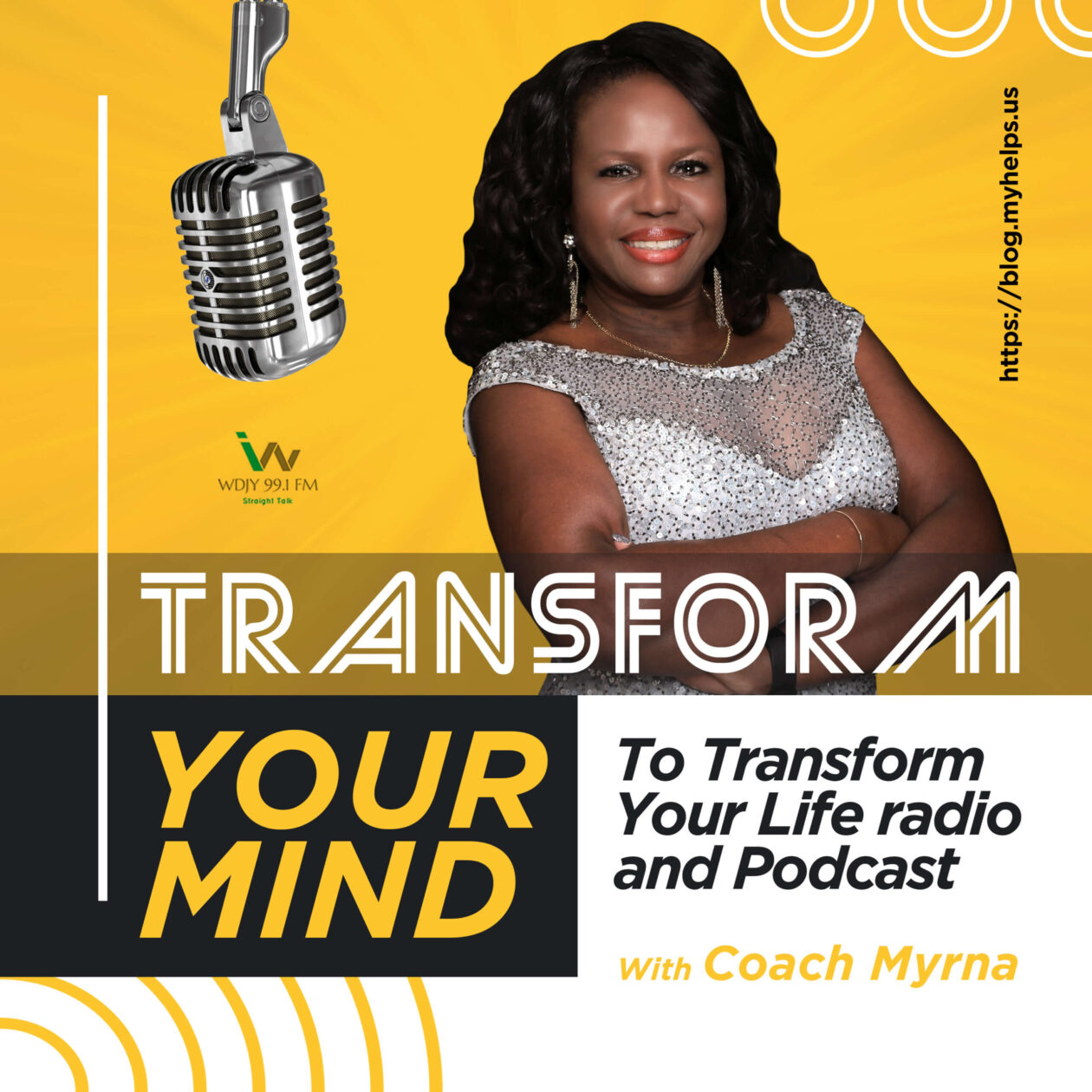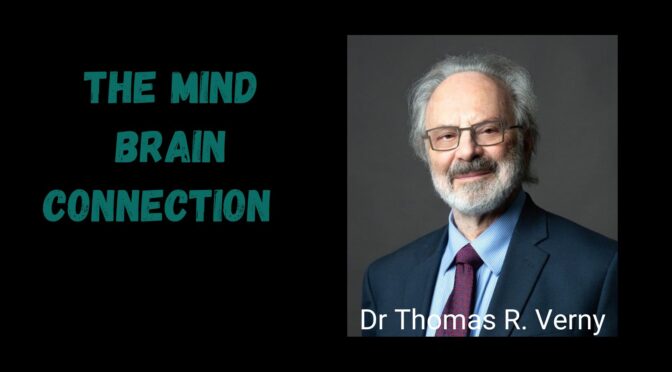Neuroscientists think of the, mind, as an epiphenomenon of the, brain. In other words, it’s a function of the, brain. Just like urine is a function of the kidneys, or bile is a function of the gallbladder. I think that the, mind, is a function of the whole body because all of these cells work together. We have never been able to locate the mind or consciousness in the brain.
Download the podcast here:
Bio
Dr. Thomas R. Verny is a clinical psychiatrist and the author of eight books, including The Secret Life of the Unborn Child, which was published in 27 countries and 47 scientific papers. He has previously taught at Harvard University, the University of Toronto, York University (Toronto), and St. Mary’s University
His book “The Embodied Mind” is a profoundly important synthesis revealing how cells utilize consciousness to not only manifest their life functions but more importantly, to create a distributed nervous system that coordinates and supports life-sustaining behavior in multicellular communities, such as those comprising the human body.
Myrna: How did your work with the, embodied mind, start?
Dr Verny: I wrote a paper on everything that I knew about, prenatal life. And there was a huge conference in Rome, Italy, the Fifth World Congress and psychosomatic Obstetrics and Gynecology, and I submitted a paper and lo and behold, I mean luck sometimes is really important in life. My paper was accepted. I was like a totally unknown young psychiatrist from Toronto. It was put on the same morning as some of the biggest lights in psychosomatic obstetrics in the world we’re presenting their papers.
Sponsored Ad
The Secret life of the unborn child
I was right up there with all the luminaries, and I got 20 minutes to speak. I noticed within 10 minutes into my talk, that there was tremendous interest in the audience about what my topic “The Secret Life of the Unborn Child.” You could just feel electricity in the air. And so, I said at the end of my lecture, I said, well, if anybody here would like to continue the conversation, please come to my room at five o’clock.
And at five o’clock, huge numbers of people were lined up. They thought that I was promoting some new ways of looking at, prenatal life. That’s when I made up my mind to write the book, which then became two years later, The Secret Life of the Unborn Child. We were taught in school that’s impossible to remember when you were in the womb, your nervous system is not mature enough to be working in the womb. I wrote the book, and it is based on very solid research that shows that from six months after, conception, the nervous system is mature enough to be able to lay down some, pretty simple, primitive memories, and there’s lots of research to back that up.
I could prove this; the evidence was solid was scientific. That children from the age of six months after, conception, would be able to remember things that happened to them in the womb. I had this patient who was able to go back further in time, back to three months after, conception, and some people even carry information from their parents’ experiences. Big traumas, like drowning or being in a war or things like that. So, I asked myself, how is this possible? How can I show this to be scientifically true? Because I was not interested in a lot of stories, I was interested in science.
The book The Secret Life of the unborn child was published in 1982, that’s a long time ago. So, seven years ago, I came across information on the, embodied mind. It’s ridiculous to think of the, brain, as kind of separate from the body and not being connected to the rest of the body. And so, what I’ve come to see is that the cells in the body, the tissues, the organs, like the heart, especially, but also the guts. They all act as kind of a backup system to the, brain. And so, when something goes wrong with the, brain. We still have our backup system just like the iCloud.

The gut is a backup system of the brain
Myrna: I think I’m getting where you’re going with this now. Go ahead.
Dr Verny: So, when something goes wrong with the, brain, the backup system comes online, right. What neurologists say we’re sort of your orthodox conservative. Biologist neuroscientists will say that other systems in the, brain, take up the slack. But there is no research to prove that at all. There’s no evidence to show that. In my book, The Embodied Mind, I bring up a lot of research evidence to show that the cells in the cells in the body are really not much different from neurons in the, brain. And so, they have, all the elements that the neurons in the, brain, have, except that they’re connected a little bit differently.
We have stressed the importance of the, brain, over the importance of the rest of the body. It also goes with our culture, which is very patriarchal, and hierarchical. And as a result of that, the emphasis is always underneath the head honcho supervisor.
Myrna: How did you get them to access that memory? Did you use, hypnosis?
Dr Verny: I have used, hypnosis, once in a while. Never really terribly successful. People did that all on their own without any help from me? In a sense, some kind of a memory would come up, something would trigger that memory. It would it was not instituted by me. Sometimes people you know, after the, Secret Life of the Unborn Child, was published, sometimes people would come to me and asked me to take them there. And I would do that, again, in a very sort of non-directive fashion. I would say things like, what is the first memory that you have in your life?

What your earliest memory can you go back to the womb?
Myrna: My earliest memory was at five years old. I don’t go back any further than that. I don’t think.
Dr Verny: You probably could. Some of your listeners can try asking 2.5- to 4-year-old kids if they remember being in the womb. Don’t ask any leading questions. Just what do you remember? What was it like?
Myrna: And that’s amazing. My grandson is almost 2 years old. I can’t wait to ask him. What I think what I’m hearing you say it is that it’s a backup for your main brain. So how does that work?
Dr Verny: The, gut, has been referred to as the second brain and there’s good things good reason for that. The, gut, has got a tremendous number of neurons in it. And it creates some very important substances such as, serotonin, for example, which is very important in terms of in terms of how you feel. People with, depression, for example, are supposed to have less, serotonin. And one of the reasons that they are depressed is because they lack, serotonin. Most people don’t realize that most of the, serotonin, in the body is actually produced in the dark.

The vagus nerve has 2-way communication to the brain
So, we have the, vagus nerve, which is that ends cranial nerves. Then we have 12 nerves coming out of our, brain. And number 10 the, vagus nerve, is the most important one because it goes to the heart and from the heart, it also goes to the, gut.
Myrna: I try to simulate the, vegas nerve, every day when I do my meditation.
Dr Verny: Think of the, vagus nerve, as sort of from the, embodied brain, to the heart from the heart to the, gut, but you hardly ever also the steps the other way, you know, traffic along the route from the duct to the heart to the to the, brain. So, but then again, you know, we have the bad circulation, and the blood is in contact with all the cells in our bodies. So, when we talk about the second brain, it’s really inaccurate, because it’s just another organ in the body that stimulates the, brain, and the rest of the body.
I like to I will give you a metaphor that perhaps best describes how I sort of picture the body working. I think it’s a very large orchestra, like let’s say, you know, the New York symphony. Let’s say more than 120 musicians, one conductor. So, each musician plays an instrument and most of the instruments are different. But the person sitting in the audience does not hear 120 instruments. A person in the audience hears one sound one sound emanating from the symphony. That’s how our memories are. That’s how our, brain, works. But instead of having 120 instruments, we have 120 billion.
Myrna: Deepak Chopra and a few other scientists, says that the, mind, is not in the, brain. Let’s talk about that for a minute, where is the mind?

Is the mind in the brain?
Dr Verny: Where’s the mind? Yeah. Yes, again, conservative academic, neuroscientists think of the, mind, as an epiphenomenon of the, brain. In other words, it’s a function of the, brain. Just like urine is a function of the kidneys, or bile is a function of the gallbladder, right? Any normal person if they think about this analogy, they can see that it’s a mistaken analogy, because the, mind, is not like urine. You know, you can’t see it. You can’t measure it, quantify it, you can’t research on it. It’s like beauty, or love. You cannot quantify it. It’s a whole different phenomenon.
So, to say that the, mind, is a function of the brain doesn’t make sense. I think that the, mind, is a function of the whole body because all of these cells work together. We have never been able to locate the mind or consciousness in the brain. There are some very interesting studies of Near-Death Experiences. Perhaps you have heard of those.
Myrna: Yeah, I read a few plus interviewed several on the show.
Dr Verny: So, very often you will have people who will have died, even for all intensive purposes. I actually experienced that with a patient when I was working in a hospital and, his heart stopped beating. I put a vial of adrenaline directly into the heart. About two minutes later, he came back, so to speak, and then he described in great detail what had happened in the room.
Myrna: Apparently, you’re supposed to have left your body and you’re watching it all. Someplace up here, right.
Dr Verny: Exactly, there is no explanation except to say that the, mind, is definitely not dependent on the body, but independent of it. The mind may very well be one of those elements of the universe like gravity or electrical charges, which have always been here and kind of borrowed from it in some way. You know, we have a tiny bit of that, embodied mind, that exists out there. And it’s so certainly, you know, is connected to the body, but it also in some ways is independent of the body.

The embodied mind
And so, that’s the reason I called my book “The embodied Mind”, because it’s not just the skull mind. Okay? It’s not just in the, brain, not just in the head, it’s in the old total body, and who knows what happens after we die. It may persist and who knows?
Myrna: I’m reading your work and I see that you also kind of like equated the mind to the matrix. You’re in this alternate universe where, things are happening in the matrix. So, let’s say that, someone is listening to this conversation. So, we’ve got the brain and we’ve got the body. We’ve got a backup system. So how can they use this information to transform their lives?
Dr Verny: I think that’s a very good question. There are many answers to that question. One of them is that the, mind, is incredibly powerful. And we just don’t appreciate how important the, mind, is. Let me let me just give you a very simple example. There was a study done, it’s mentioned in my book by a Harvard psychologist Ellen Langer. And it’s a very simple study, and it’s just so beautiful. She studied hotel maids in New York, and she divided them into two groups of 41. One group, she said that the work that they do, actually follows and lives up to the Surgeon General’s recommendations for daily exercise. There work was like exercise, like some people go to the gym, but you work, it’s the same thing.
The other group was told something quite different. At the end of at the end of 30 days, they measured all kinds of measurements on these maids. They found that the group that believed that they were exercising lost weight, they decreased waist to hip ratio, and they had a 10% drop in blood pressure. And they did nothing different from the other group. They only believed that they exercising. Now the same thing you know, happens in placebos. You can tell someone that this pill is going to take your headaches away. And it does, you know, nine times out of 10.

What you believe in your mind you create in your body
Myrna: Yeah, and as a psychiatrist, you also know the fact that belief is so important. Now someone coming in sitting on your couch and believes something, regardless of if it’s true or not, that’s how their body and their, mind, and their world is going to respond.
Dr Verny: Right, in terms of practical advice, it’s very important for people to change their attitude towards their own bodies and towards themselves. You know, there are, unfortunately, a lot of people around with low self-esteem. There are a lot of people around who have been criticized as children. I just saw a patient yesterday. You know, and he was always very enthusiastic.
And sometimes he would if the teacher would ask a question, he would speak out without putting up his hand and we would be punished for that. Instead of a good teacher would say, Yeah, okay, that’s very good. But perhaps next time you could put up your hands. Instead of that, you know, he was put down so now you know, even when he goes shopping, he’s afraid that somebody might ask him a question. He might not be able to come up with the right answer. I mean, he’s just full of anxieties.
Myrna: Wow, such a simple thing like that has a far-reaching consequences.
Dr Verny: My advice is, be honest. Look in the mirror and look at yourself. And if you find that there are certain things you don’t like about yourself, well face that and make it better, improve it. Don’t go around trying to cover up That’s not the way to do it. Get it out of your system. Find out why you think that you are not beautiful or that you are not clever or whatever your negative beliefs are. Get rid of them. Talk to your friends, ask them why they like you. And, and you will be you will be astonished what they say.
Myrna: Yeah, because you never see your strengths yourself.
Dr Verny: So when you get that kind of a feedback, then perhaps you can start believing in it. And if you believe in it, well then you will become it.
Conclusion: The embodied mind
Myrna: Okay, this is a good point to talk about your book. It is called “The Embodied Mind: Understanding the Mysteries of Cellular Memory, Consciousness and our Bodies.” So, tell our listeners about your book, tell them where they can pick it up. Pick up a copy, talk about your website. And what do you want people to walk away with after reading your book.
Dr Verny: Will they can pick up my book on Amazon. My website is www.TRVernyMD.com. It’s a very rich book because I read above 5000 books and journals in preparation for that book. And it has actually 500 references in the back of the book scientific references. So, it has a tremendous amount of information in there and at the end of each chapter, you have, practical sort of takeaways.
But I think the most important feature is just to develop a respect for your, mind, and how powerful it is and how it can influence every particle, every cell in your body, how you think about yourself, is very important. And also, you know, interacting with other people. touching other people is very important. You know, the hug a day keeps the doctor away, as far as I’m concerned.
So, I think those things are really important and, and to realize how important also the, gut bacteria, are because every day we are learning more and more about the importance of the, gut bacteria, for example, just one more thing. People take antidepressants when they’re depressed. 1/3 of patients do not benefit from antidepressants. The reason they don’t benefit is there’s nothing wrong with the drugs. They’re pretty good drugs, actually, but some people have bacteria in their gut which destroy those particular antidepressants, and so they don’t work.
Additional Resources

